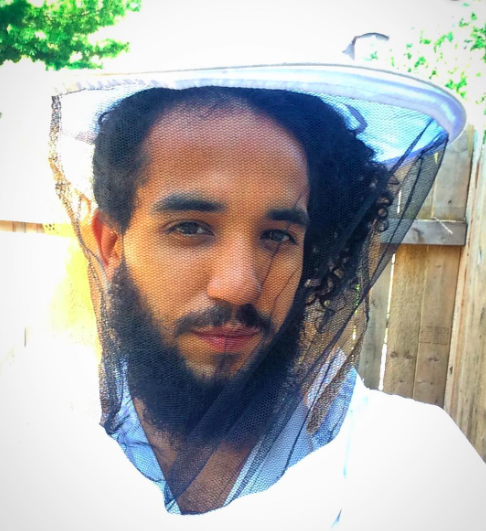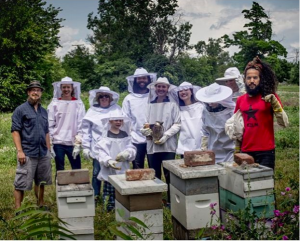Antonio Rafael: Beekeeping to Reconnect to the Land & Indigeneity

Antonio Rafael is an artist-farmer-beekeeper-educator-environmentalist who co-founded SW Beetroit, a collaborative of beekeepers in the Detroit area whose mission is to improve the ecology of the neighborhood through green spaces and tree planting. One of three people running the show and one of two of Puerto Rican descent, Antonio graduated college in 2012 during a period where 50% of Michigan’s Black population was put into “emergency management” following the 2008 U.S. financial crisis.*
Antonio’s critical consciousness, radicalization, and draw to beekeeping emerged as Detroit was going through this economic downturn. Along with a group of friends, Antonio started a Chicago Indigenous hip hop and art collective (Raiz Up) to organize civil disobedience to protest the emergency management. He says, at a time when 1 in 3 Detroiters were losing their homes, he “turned to agriculture, farming, beekeeping, as a way to heal myself.”
The SW Beetroit collective is more than about selling honey. They aim to expose the community at large to beekeeping and reconnection to the land. Their programming has garnered interest from young people and Black and brown communities in particular.
In addition to the Black and Latinx communities served, “A lot of my Yemeni neighbors love it,” says Antonio. “They like to buy the honey. A lot of people don’t trust in store honey so they appreciate that aspect of it.”
SW Beetroit works with and mentors young people. Antonio says, “It’s fun to watch them develop as young people” in addition to seeing their knowledge grow about the bees. He sees them gain “a certain competency…and confidence…from working with something that a lot of people [are] scared of.”
In Detroit’s landscape where food insecurity and health issues disproportionately affect Black and brown communities, engaging in beekeeping has proven healing for Antonio and the community at large.
“There’s nothing like you getting your hands in that dark soil and just like cultivating life,” says Antonio. “I think bees and honey – it’s just something that’s so good and so healing for communities that are so marginalized and so underserved and so traumatized.” In producing their own honey, they bypass the larger capitalist systems at work and also provide an opportunity to connect with nature and the “rhythms of the seasons.”
Antonio does a lot of work with Native American communities related to environmental justice and sees a deep need for Black and Indigenous communities “to be establishing as much sovereignty as they possibly can,” particularly for those located in the city where there’s a tendency to be more disconnected from nature.
One advantage to beekeeping in an urban setting like Detroit is there are so many abandoned houses and properties, says Antonio. There’s a lot more foraging that happens because people don’t cut their lawns. “We aren’t subjected to fungicides and pesticides like rural bees are.” Of course, there are negatives too – with so many residents buying potted plants from places like Home Depot, the chance of engaging with might be a little higher.
Another advantage to SW Beetroit’s operation is that they favor natural methods of treating mites over pesticide use. Antonio uses King Stropharia white cap mushrooms to help break down woodchips to increase soil organic matter to make use of the clay that’s on the land. He’s noticed that the bees will flock to the mycelium (mushroom network) throughout the year. Research by Washington State University and Cornell University is ongoing about metarhizium fungi that helps to attack varroa mites, but rather than wait around to be “sold” finalized products, Antonio and crew rely on their own systems to deal with mites.

Antonio says, “We’re harvesting mushrooms with the intention to create extracts that we will be putting in our feed next year. And working with Native communities to do that as opposed to white, power institutions and businesses.” Yet another way SW Beetroit has found to remove themselves from the dominant structure and money systems with which Black and brown communities generally have less access to and a poorer quality relationship to. Antonio says, “Once we get it down [how to best use mycelium for treating mites], we wanna be spreading that knowledge.”
SW Beetroit is a smallish operation: 30 hives. But they are small and mighty. For Antonio, “It’s really about the culture. If the thousands of beekeepers or even just a couple hundreds of those folks were just treating their bees a little more holistically, it would be less of a threat to our bees, so we feel like it’s our duty to share some of the knowledge and share some of these interesting techniques we are trying to develop.”
*Emergency management is essentially a financial emergency that’s imposed by the governor that allows the governor to put in place bankruptcy lawyers that take the place of government).
Media Attributions
- Antonio Rafael © Antonio Rafael is licensed under a All Rights Reserved license
- Antonio Rafael with community group © Antonio Rafael is licensed under a All Rights Reserved license
A systemic agricultural insecticide resembling nicotine that are toxic to bees.


Feedback/Errata